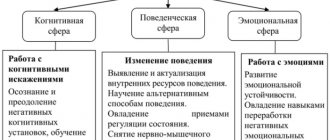Today, Freud seems to be a figure from the past and is associated primarily with the concept of libido and sexuality. However, many of his ideas have not lost their relevance.
“My students continue to study denial, projection and other defense mechanisms, as well as the unconscious, psychosexuality, psychosomatics, transference and countertransference. They may know almost nothing about Freud himself, but they certainly recognize his enormous contribution to science,” writes Anthony Smith, a psychologist and teacher of psychopathology at the University of Massachusetts.
In general, there are quite a lot of defense mechanisms, from purely adaptive approaches such as humor and anticipation to such specific conditions as repression and overt psychotic distortion. Freud, who devoted countless hours to each patient, was able to understand that the various behaviors that prevent progress in treatment are nothing more than subconscious defenses of the ego.
Let's talk about three methods of protection.
What is denial in psychology
Denial in psychology is one of the methods of psychological defense that involves abandoning reality. A person refuses thoughts, feelings, desires and emotions that his consciousness simply cannot accept. To put it simply, it is an unwillingness to come to terms with the truth.
In denial, people persistently try to avoid new information if it does not match their existing positive opinion about themselves. They either shy away from it or ignore it completely.
Interesting! The concept of denial as a method of psychological defense was first introduced by Sigmund Freud. Anna Freud offered more detailed information about him.
Normally, denial is turned on for several hours, while the brain and consciousness get used to new circumstances, entering them into an already existing database. Afterwards, other psychological defense mechanisms are activated, which sooner or later lead to acceptance. It can be partial or gradual, as if extended over time. But it still happens.
Denial develops in childhood, when a small child cannot yet influence the world around him and thereby change reality. According to psychology, most often it manifests itself in suggestible people or those who suffer from any diseases of internal organs and systems.
The danger of denial
The human psyche may be overly inclined to ignore, which can cause the development and functioning of pathological personality traits, mental dysfunction and disorders.
Common situations that the human psyche denies are:
- Ignoring the disease. Fear of the disease and its consequences, the person refuses to notice its obvious signs or symptoms. This phenomenon is dangerous, since a person may not consult a doctor or specialists for treatment in a timely manner, as a result of which the disease develops rapidly. In this case, the care and support of loved ones can cause rejection and irritation in a person.
- Ignoring dependency. Alcohol addicts believe that they can stop using alcohol and drugs at any time. Their opinion does not allow them to seek help from specialized institutions. It should be noted that recognizing the presence of a problem is one of the fundamental motives in recovery.
- Ignoring fear. People involved in extreme sports usually deny the danger of their activities, fear is dulled. Often this leads to the fact that they begin to be negligent about safety precautions and this leads to dire consequences.
- Ignoring problems in family life. People in marriage often get used to each other so much that they become uninteresting to their partner, thereby moving away from him. Partners ignore obvious signs of trouble in the union, which is why many family unions break up due to the fact that both partners have protective psychological mechanisms.
- Denial of the death of a loved one. The first reaction when receiving information about the death of a loved one is denial. The denial mechanism gives a person the opportunity to perform the necessary actions in the event of an incident.
Finished works on a similar topic
- Coursework Defense mechanism: denial 470 rub.
- Abstract Defense mechanism: denial RUB 270.
- Test work Defense mechanism: denial 200 rub.
Receive completed work or specialist advice on your educational project Find out the cost
Denial as a psychological defense mechanism
In some cases, the use of negation is justified. Here are some examples:
- A person is faced with a serious problem, for example, the death of someone close to him. Including psychological protection of consciousness and psyche, he protects himself from pain, horror, feelings of helplessness and feelings of loss. In this state, he is still able to make informed decisions, including about organizing a funeral. A similar situation happens during natural disasters. At first, a person is not aware of what is happening around him. Thanks to this, he can mobilize and direct all his strength to salvation. And only then, when nothing threatens his life, will he relax and be able to accept new circumstances.
- The second example concerns serious illnesses. Most patients, after diagnosis and the start of treatment, live as if outside of reality, not perceiving what happened as the truth. Sometimes it seems that this is how it should be, because in this way they preserve their personality and sanity from shocks. Denial turns on unconsciously. It is also unconscious and switched off when new conditions arise, for example, changed treatment methods or awareness of imminent death.
As a third example, we can cite the familiar phrase spoken by Scarlett O'Hara: “I'll think about it tomorrow.” The girl fell asleep in the old reality, leaving the new one with its shocks in the morning. This is the conscious use of denial as a method of psychological defense. There are two options for the development of events here. The first is that circumstances will change so much that the issue will no longer have to be resolved. The second is that the person will still accept reality and work on solving the problem.
Stages of experience
Psychologists identify 5 stages that a person must go through before accepting a traumatic situation, for example, receiving a certain unfavorable diagnosis:
- Denial: disbelief in what happened, expectation of a miracle and refutation of the information received.
- Anger: searching for answers to the question “why?”, a person begins to get annoyed by people who are faced with the same problem, searching for those to blame.
- Bargaining: a peculiar desire to “buy off” the inevitable, a willingness to give away funds to correct the situation, committing uncontrolled spending, delving into religion.
- Depression: a person loses hope, he has no strength left to fight the problem, appetite decreases, thoughts of suicide appear.
- Acceptance: coming to terms with what happened, accepting the situation as it should be.
Psychologists have come to the conclusion that not every person goes through these 5 stages. They may be experienced in a different order, or a person may experience only some of them. In such cases, denial is part of and is an important part of the process of accepting the inevitable.
Do you need to select material for your study work? Ask a question to the teacher and get an answer in 15 minutes! Ask a Question
The denial mechanism ensures that content that can cause damage to the psyche is kept from consciousness. The effect of strong traumatic factors is smoothed out, and the psyche mobilizes its resources to adapt to the current situation.
Examples from life
A good example is a person who abuses alcohol and his family members. Denial allows him not to see the problem, to refuse it. It is not surprising that alcoholics often use this defense mechanism, since otherwise they would have to not only admit their addiction, but also do something to get rid of it.
The most dangerous thing in this situation is not only that denial destroys a person both physically and morally, problems appear in the family and at work, relationships with other people deteriorate, etc. Children of alcoholics often become alcoholics themselves. And this is despite the fact that in childhood they vowed not to become like their fathers/mothers. If they admit that they have become the same, they will completely destroy the positive image of themselves as a person. In addition, for them it will be a betrayal of themselves in childhood, a deception of that small, pure and sincere man who promised himself to grow up differently.
Let's give another example. Already in adulthood, one of the woman’s two children died. Several years have passed, and she still continues to clean his room, while maintaining the order of things that was with him, talking only about him, fitting him into her plans. She doesn’t seem to notice the second child, just like everything that happens around her. The house, dacha, health status, family relationships are ignored. The woman looks like an insect frozen in amber resin. She lives in her reality.
Mistakes when negating
There are 2 mistakes that are made when denying information, among them the following:
- A shift in emphasis from love to hatred, as a result, only hatred remains in the mind, for example, a shift from love for oneself and a partner to rejection of any qualities.
- Finding the reason that prevents the desired from being achieved. All the diversity of life is seen from one angle; a person must see the multifactorial and multicausality in life - this is what will help to realize, for example, the absence of culprits and the practical impossibility of punishing them.
The path of denial is simple, it is characterized by increased negative emotions, a feeling of distance and a narrowing of perception. What should you do to cope with pain and fear? Here are some answers to this question:
Focusing on the feeling of love. However, the situation can sometimes be so unbearable that a person will give up the feeling of love altogether. For example, murderers and maniacs are people who have gone far in their denial and have abandoned love forever. It is by strengthening the feeling of love that one should respond to severe pain. This path leads to expansion of consciousness, increasing the ability to cope with fear and pain. A person who narrows his consciousness through denial not only becomes a source of suffering, but also turns out to be unable to experience a feeling of happiness.
Awareness of the multi-causality of what happened. Don't separate yourself from those who hurt you.
Summarizing
Despite all its complexity and confusion, the model of defense mechanisms by Plutchik, Kellerman and Conte can be a good practical tool for greater awareness and effectiveness in life. We invite you to once again go through the list of possible psychological defenses and answer the questions:
- What defense mechanisms have you noticed in yourself?
- Is there one among them that you use more often than others?
- Which of these reactions do you find difficult to control and be aware of when you resort to them?
- And most importantly, what other ways to cope with unpleasant events, feelings or your shortcomings are there? How else can you react and behave? What approach or behavior will be most effective and beneficial in the long term?
The more aware you are of your unconscious psychological defenses, the less they control you and are automatic. This way, it is possible not only to choose the most optimal behavior, but also to become the master of your reactions and your life. If you are interested in developing the skills of awareness and management of your emotions, we draw your attention to the online program “Mental Self-Regulation”. This course teaches the ability to control and harmonize your mental states, which improves your quality of life.
We wish you good luck!
We also recommend reading:
- Storytelling
- Hakomi Therapy
- Behavioral mechanisms
- Emotions and health: how they are interconnected
- Fear: psychological foundations and famous scientific studies of this phenomenon
- Sublimation in psychology
- Robert Plutchik's Theory of Emotions
- Fundamentals of neuroeconomics: how do we make decisions?
- Defense mechanisms of the psyche
- Reframing Your Dark Side
- Intelligence: definition, development and degradation
Key words: 1Cognitive science, 1Psychoregulation
Message management
When deciding how to respond to negative criticism, you must first understand the message behind it. Denial has a simple essence: you should not do what you are doing. You shouldn't show what you show. Say what you say. None of this should happen!
In principle, if you bring the denying statements to a certain absolute, you get a fairly clear and concise message: you shouldn’t exist!
However, this is just the tip of the iceberg. In general, behind any devaluing criticism there are various reasons, motives that force a person to speak out in such a way, belittling and leveling other people’s merits and successes. In other words, this is a movement in one of two directions:
- The desire to help a person is moving forward.
- Destructive psychological defense - moving backwards. Let's move on to examples.
When faced with devaluing criticism, try to understand what goals your interlocutor is pursuing.
If his words contain elements of analysis and he tries to push the conversation towards dialogue, discussion, compares advantages and disadvantages, perhaps such criticism contains some positive resource that you can use for your benefit.
Now let’s imagine a slightly different situation: a critic condemns you, ridicules you, happily lists real or imaginary shortcomings, completely forgetting about any advantages. In this case, we can assume that they are simply trying to belittle you, stop you, and hinder your development.
This is a destructive criticism of denial, in which you will not find anything useful for yourself. It should not be taken to heart. It is best to simply refrain from any reaction.
An important point: denial as a form of psychological defense is usually used by people who themselves are extremely sensitive to other people’s negative assessments, rejection, and failures.
A person who denies cannot support his point of view with any evidence. He is harsh, categorical in his judgments, incapable of analysis or dialogue, does not present any clear arguments, and emotions usually appear instead.
When there are no reasonable arguments, but there are too many emotions, the critic is clearly not rational. If at the same time there is a sense of passive aggression directed at you, you can rest assured that he is defending himself.
The critic’s motive becomes clear: hit first so that they don’t hit you. Cause pain so that they don’t hurt you.
The critic consciously or unconsciously tries to suppress the opponent so that he does not begin to point out his own shortcomings and mistakes. Since such a person is extremely sensitive to other people’s criticism, you should not evaluate, condemn, argue or criticize him in response - this will not give you anything. It is very possible that the conversation will end in a completely banal and even ugly scandal.
Arguing with a person inclined to unconditional denial is a thankless task. Such a dispute is like talking to a wall: all your arguments, even the most reasonable and logical ones, will simply bounce off into the void.
Being persistent when you want to achieve something, and at the same time a person vehemently denies your intentions, is illogical and short-sighted. Any reasonable arguments will be meaningless if you see that your opponent is not ready to discuss and is focused solely on denial.
Why is denial dangerous? It can lead to a loss of interest in your achievements, plans, dreams, people around you - and life itself. Therefore, it is very important not to take anything critics say too literally. Especially if they are trying to thwart your aspirations.
Don't let negative statements block your progress! You should not go with the flow and listen to other people just because they are more persistent than you. Older. More authoritative. They seem smarter or more successful. A critic's categorical opinion cannot serve as proof that you will not be able to implement your plan and achieve what they could not.
Historical reference
Elisabeth Kübler-Ross is an American with Swiss roots, psychologist, writer and founder of the concept of first psychological aid for the “doomed” and dying. She studied near-death experiences in depth and published a book called “On Death and Dying.” The printed edition in 1969 spread throughout America and became a bestseller. It was in this work that the doctor spoke about the stages of perception of trouble (five stages of accepting the irreparable or inevitable). It is noteworthy that the technique was used only if a fatal illness was detected in the patient. Experts prepared him for inevitable death.
Substitution
Have you ever encountered a boss so bad that you wished he would disappear into the ground? Most likely, at work you held back, but at home, in your hearts, you could shout at your children for no reason. This is substitution: desires are shifted from the original object to a more suitable harmless substitute.
This often happens to children who are rude to teachers. A teacher is an authoritative figure who temporarily replaces a parent, and much depends on gender. For example, a child has a tense relationship with his father, but it is not safe to contradict him, and all the hidden hatred spills out on the male teacher.
Sometimes this serves a secondary purpose. Let's say the father works the second shift, and the child does not want to intersect with him. He learned that for being insolent towards the teacher he would probably have to serve an extra hour after school, which meant he would go home when his father was no longer there.
In such cases, in therapy, specialists help the client understand where the real problem lies and learn to resist it.
Another example from Anthony Smith is a boy with chronically poor behavior at school. Moreover, the aggression was directed at the teachers. The psychologist asked if he had hostile feelings towards his mother, which he had never talked about. And the boy said: he cannot forget that she did not protect him from his father when he attacked him with beatings.
Since his mother represented his only stable attachment, it was not in his interests to enter into conflict with her. Therefore, he found no better way than to take out his resentment on those who symbolize the mother figure. Joint therapy helped to cope with the problem, during which it was possible to figure out what happened when the boy’s father was still living in the family.
Taking back yourself
When correcting behavior, a person goes through a number of stages:
- pretend play;
- awareness of one's falseness (fear);
- uncertainty (loss of familiarity and lack of reference points);
- awareness of the real horror of the situation (suppressed himself and limited himself);
- regaining yourself and your emotions.
Unfortunately, it is almost impossible to go this route on your own. I recommend contacting a specialist. Depending on the situation, psychologists give preference to Gestalt therapy, art therapy, psychodrama, individual counseling or another method of psychocorrection.
Crisis: first reaction and possibility of overcoming
Everyone may experience a period when troubles, like snow, fell at the same time. If they are solvable, it is enough for a person to pull himself together, develop a strategy of action and, following it, bring existence to an acceptable level. However, there are options when nothing depends on us - under any circumstances we will suffer, be nervous and worry.
In psychology, such a period is called a crisis; it should be treated with special attention. Firstly, so as not to linger in the stage of deep depression, which prevents you from building a happy future, and secondly, to learn a lesson from the problem.
Each person reacts differently to the same situation. First of all, it depends on the type of upbringing, status, and inner core. Despite the differences between individuals, there is still a formula of 5 steps to accepting the inevitable, which is suitable for all people. It helps you get out of crisis difficulties on your own.
Categories
Today we will talk about such a phenomenon of the human psyche as psychological defense.
What is psychological protection?
This is a system of mechanisms that protect us from negative experiences, mental pain, anxiety and many other negative factors that threaten the integrity of the individual. If it were not for psychological defenses, we would constantly be under severe stress, cry or scream for any reason, throw ourselves at others, commit impulsive acts, etc. - in a word, they would see life in black.
For the first time, the Austrian psychologist, psychiatrist and founder of psychoanalysis, S. Freud, began to study psychological defenses. He interpreted the work of the defense system as a way of resolving the confrontation between unconscious drives and social norms (demands, prohibitions, etc.).
Psychological defense mechanisms are universal: they are inherent in us by nature and represent patterns of behavior or response to a traumatic situation.
Psychological defense does not change reality, events, or people’s characters; in addition, it distorts the perception of reality. In this regard, many problems remain unresolved. What to do? Psychologists advise: to make fear go away, look into its eyes. Let's sort it out in order.
Three lines of psychological defenses
There are three lines of psychological defense:
- conscious stereotypes (help us exist in society);
- archetypal defenses (protect society, group, collective through the individual);
- unconscious defenses (protect our psyche from wear and tear).
At the same time, these lines form a holistic system that maintains our spiritual balance and helps cope with stress. Let's look at each of the lines in more detail.
Perceived stereotypes
These stereotypes are formed in our minds from early childhood, when we internalize social norms and rules. At first, these are the norms of your family: wash your hands before eating; eat with utensils rather than with your hands; draw in an album, not on a table. After some time, the child learns the norms of other communities: how to behave on the street, at a party, in kindergarten, at school, etc. All this allows us to avoid ostracism, and as a result the society in which we exist accepts us. Thanks to the principles laid down in childhood, we save time on thinking and taking actions, and also increase the likelihood of a favorable resolution of the situation.
For example, we initially learn to respect subordination, speak respectfully with elders, show signs of attention towards them, take their opinions into account, etc. We also understand the boundaries of what is permitted (for example, we learn that in a store you cannot behave at home, etc.).
Archetypal protections
This is a series of behavioral models that help to overcome difficulties and not get confused in extreme situations that arise in the life of a group, community, colleagues, friends, loved ones, etc. It is believed that these protections have been formed over thousands of years, and since the person has remained an element of the community, the protections continue to function. They do not always manifest themselves in our behavior, but only in cases when society is in danger. A person may not even know about the resources of his psyche and the capabilities of his body, and in a stressful situation, in order to save his family, he may commit heroic actions that he would not dare to do in ordinary life. Disaster medicine knows of cases where children, finding themselves in an extreme situation, without hesitation, helped those who were weaker (for example, boys helped pull girls out, gave them their clothes; girls calmed adults who could not pull themselves together). They performed such actions automatically, on a subconscious level: “If your neighbor is feeling bad, you need to help him.”
You can observe subconscious behavior patterns in yourself. For example, your friend quarreled with his parents, and you automatically begin to help him - listen, console, give advice. Many are willing to make self-sacrifice for the well-being of others. And it’s all about the subconscious, which dictates to us a program for protecting a small or large society.
Unconscious defenses
Everyone hears what they want to hear.
The essence of unconscious defense is that our psyche, without distortion, perceives only information that cannot traumatize it. If any fact, event, actions or words of a person threaten our peace of mind, cause anxiety or tension, unconscious defense immediately turns on. As a result, we do not perceive incoming information at all or perceive it in a distorted form. For example, some wives defend their husbands: “He’s not an alcoholic, he just has a stressful job.” Or a sick person says: “I feel better today, I won’t go to the doctor. I’m not sick, why are you all bothering me?” This is how the denial mechanism works: “You are all wrong, everything is fine with me/we!” As a result, a person artificially restores his mental balance, protects himself from fears, and reduces internal tension. Unfortunately, this trick of consciousness helps only for a while. An alcoholic remains an alcoholic, and a sick person does not recover. After some time, mental balance needs to be restored.
Let's consider the forms of unconscious defenses.
■ Escape. In the Paleolithic era, in case of a threat to life, a person defended himself or fled. Today escape has been modified and taken on unconscious forms. For example, if a person has not been able to build trusting relationships with people since childhood, he increasingly withdraws into himself and, as a result, becomes an introvert. Or if a person is not confident in the favorable outcome of any complex matter, he will, under any pretext, refuse to go to organizations, call people or generally make any efforts.
The main and painful consequence of running away is the inability to communicate constructively, ask for help, make suggestions or make comments if something does not satisfy. For example, fear of offending, fear of putting oneself in an unfavorable light lead to vague wording or replacement of requests. As a result, the person does not resolve his issue, wastes time and experiences personal discomfort because “nothing worked out again.”
For example, an employee returns from vacation and sees a mountain of other people’s papers on her desk. She is ashamed to ask the culprit to clean up after himself, so she does it herself. As a result, the problem is not solved, and the situation repeats itself after each vacation.
Sometimes escape manifests itself in the form of withdrawal into a specific activity (not to be confused with a hobby). In a situation of escape, a person is so carried away by his favorite activity that he directs all his mental and mental strength only to it. This activity saves him from unrequited love, from self-doubt, helps him forget about problems and personal shortcomings. Of course, such a person can demonstrate outstanding results in his field, but he will not be able to make friends or friends, because his personality has developed disharmoniously all this time.
■ Denial is characterized by selective attention: “My house is on the edge, I don’t know anything.”
Selectivity helps us ignore the things that make us anxious and increase the intensity of the conflict. Denial is often the first reaction to irreversible events - illness, death. Denial can also be seen in family relationships: for many it is easier to close their eyes to a problem than to solve it. For example, a wife does not notice her husband’s alienation and, instead of talking, pretends that everything is fine. As a result, the husband leaves for someone else. Or the parents don’t notice that their son is addicted to drugs. Result: my son has a severe drug addiction. Why is this happening? People simply do not allow themselves to think that this could happen in their family.
In addition, the form of denial can take on the appearance of self-praise. For example, a child performed poorly at a competition, returns home and tells everyone about his victory, and he himself fully believes in this victory, or a lazy worker who creates the appearance of work: he litters his desk with papers (supposedly there is no time to clean), walks along the corridor with documents, stands idle in the reception area, answers the phone in an irritated voice, as if hinting: “I’m so busy, and here you are.” Moreover, he sincerely hopes that he will not be found out.
■ Rationalization. Sometimes it seems to us that it is easier to eat a toad than to admit that we are wrong. And in order not to recognize it, nature came up with a wonderful mechanism - rationalization. This mechanism helps to find explanations for one’s own unseemly behavior. Thanks to rationalization, you can isolate yourself from the “evil world” and feel like a king against the backdrop of people who understand nothing.
For example, a person who does not want to look for a job makes an excuse that there are no worthy offers; a child who eats all the sweets in the house believes that he is still small and can do anything; a boss who bullies his subordinates proves to himself that he is accomplishing a great mission by not allowing his employees to relax.
By the way, the hero of the story “Sakhalin” A.P. Chekhov, having killed his victim, justified his behavior by saying that he was slurping loudly at the table, violating general etiquette.
■ Suppression is expressed in the fact that we can forget some feelings, facts, events and people who at one time brought us pain, suffering or simply any unpleasant emotions. For example, the name of the person who once offended us, or the opening hours of the office where we need to go to resolve an unpleasant issue. In this way, the psyche protects itself, tries to save us from communicating with unpleasant people, protect us from going to unpleasant places, etc.
■ Repression is also associated with a special mechanism of memory. Repression is similar to suppression, except that the event is not completely forgotten. The most traumatic part is erased from memory.
For example, a friend constantly complains to you that her mother-in-law is cruel to her. When you ask her to give examples, she can't really tell you anything. He remembers that there was a conflict, but for what reason and what served as the starting point, he doesn’t remember.
Remembering more good things than bad is a natural function of the psyche. But especially sensitive people, on the contrary, remember only the bad. This leads to a depressing state, depression, painful memories of traumatic situations: “But he told me this, but he did this. How could he?
■ Substitution is expressed in the form of satisfying an unacceptable desire in another way permitted by society. It can also occur in the form of transfer from one reaction to another. On the one hand, this transfer allows us to solve the problem, and on the other hand, to avoid social censure.
For example, one person is angry with another for something and wants to take revenge on him. Since revenge is condemned by society, a person takes revenge on his enemy with offensive jokes. If he is offended, he immediately asks for an apology, saying that he did not want to offend anyone, it was just a joke.
Therefore, if they constantly make fun of you, you should not blame yourself for being too touchy. Perhaps these people hold a grudge against you, but don't know how to say it.
In office life, hidden hostility can manifest itself in the form of hypercontrol over subordinates. For example, the boss does not like an employee who is very similar to his daughter’s negligent boyfriend. He understands that if he tries to tell someone around him about the reason for his hostility, he will be laughed at. Therefore, the boss finds an artificial reason to throw out his aggression on his subordinate - he begins to control him excessively, finds fault with him, accuses him of not doing anything, etc.
■ Projection. Let’s remember the folklore: “There’s no point in blaming the mirror if your face is crooked,” “Whoever calls you names is called that himself,” “You look at your neighbor with all your eyes, but at yourself with drooping eyelids” (Vietnamese proverb).
The truth of these expressions is undeniable: before you evaluate someone, look at yourself. It’s painful to criticize yourself – it’s easier to take it out on someone else. In psychology, this behavior is called projection. With projection, a person, seeing his own shortcomings, does not want to admit them, but notices them in others. Thus, a person projects his vices and weaknesses onto other people. Agree, how difficult it is to admit to ourselves that we envy someone, and how easy it is to see this envy in another person!
You can project feelings, thoughts and even behavior. Thus, a deceiver thinks that everyone around him is a cheater and wants to deceive him, a greedy person sees those around him as stingy, and someone who needs money will hate people with low incomes.
By the way, projection has not only negative, but also positive manifestations. For example, if it seems to you that everything around you is wonderful and wonderful, this means that you are in harmony with yourself; If you see only friends in your colleagues, this means that you are a kind and sociable person. No wonder they say: “Smile at the world, and the world will smile at you.”
■ Identification is expressed in identifying oneself with a person, in appropriating his personal qualities to oneself, in elevating oneself to his image. Identification can also be expressed in the desire to be like not only one person, but also a group of people. Identification protection is also called social mimicry. Most often, social mimicry manifests itself in adolescents. For example, a schoolboy strives to be like everyone else, tries to merge with his company. If everyone in the company wears expensive jeans, he will beg his parents for them; If it’s common to smoke in a group, he will definitely become addicted to this harmful habit. The desire to be like others creates the illusion of security in a teenager.
Social mimicry also manifests itself in the desire to be like people we fear or depend on. Very often, people who are offended begin to copy the behavior of their offenders. Some people need this identification in order to become as “strong-willed” and “strong,” while others need it in order to take it out on the weaker ones. In psychology, this mechanism is called “identification with aggression.”
■ Alienation is expressed in the division of our “I” into several parts and their consistent use. This process occurs at moments when a person experiences severe physical or mental pain. Let's give the simplest example. A person who has lived in his native land almost all his life suddenly leaves for a foreign land. Undoubtedly, it will be very difficult for him to leave his native land, especially if people dear to him remain there. In a new place, it will seem to him that a piece of his soul remains in his native land.
■ Fear of new things. Have you ever noticed that your loved ones, family and friends seem to be asking for your advice, but in fact they don’t need it? Such people are generally afraid to learn something new, because they need to rebuild, reconsider their views on life, doubt previously acquired knowledge, theories and opinions. Therefore, such people subconsciously protect themselves from advice - they talk a lot themselves and do not let you speak, they complain and do not listen to you (vest search syndrome), they are capricious, protest (they say that you are coming up with inappropriate advice), accuse you of incompetence, promise to follow the advice then, but do not fulfill their promises.
■ Artificial psychostimulants. Alcohol, tobacco, and drugs not only reduce your health to nothing, but also create the illusion of “control” of your psycho-emotional state. They, of course, do not solve the problem that has arisen.
Other unconscious defenses
These include:
- psychosomatic diseases (the occurrence of somatic diseases due to mental trauma);
- passive aggression (tendency to be late everywhere and everywhere, reluctance to do certain work);
- reaction or aggression towards innocent people (sharp jumping up, screaming, hitting the table, aggressive attacks on people for imaginary reasons);
- dissociation (after traumatic situations, the tendency to pretend that nothing happened, reluctance to solve problems, self-withdrawal);
- internalization (refusal to get what you want: “Yes, it hurts me. I’ll get by”);
- regression (return to childhood behavior patterns - whims, hysterics, throwing things, etc.).
The benefits and harms of unconscious defenses
Let's look at the benefits first.
Psychological defenses:
- help preserve the integrity of the individual and protect it from disintegration, especially when there are conflicting desires. It is known that there are many different “I”s in a person (one “I” wants one thing, another – another, a third – a third). Psychological defenses are needed to bring all these “I” together and allow them to “agree”;
- help to resist diseases, believe in one’s strength, reassure that everything will be fine, everything will be restored;
- prevent disorganization of mental activity and behavior. For example, in a moment of sudden stress, disbelief in everything that is happening saves consciousness from destruction;
- protect against negative qualities that a person does not possess, but mistakenly admits to himself. For example, it seems to a person that he is overly demanding of others, although in reality he is not. For the purpose of protection, he may begin to convince himself that overly demanding people are more successful in business, have excellent insight and are demanding of themselves. Thus, defenses save a person from mythical shortcomings and reduce self-blame;
- restore self-esteem, help to accept a painful situation without lowering self-esteem: “Well, so be it. I’m still better than them,” “These people are unworthy of me,” etc.;
- help maintain social approval. For example, a person did something wrong and, knowing this, turns the situation around: “It’s not me who is to blame, but other people/fate/circumstances”, “I’m not like that - life is like that”;
- preserve relationships between people. For example, an employee does not like that his colleague gossips all the time and tries to involve him in conversation. He prefers not to bring the situation to a conflict and, instead of expressing everything, pretends to be uncommunicative.
If we talk about the dangers of psychological defenses, they are:
- do not change the order of things, but only relieve anxiety and inconvenience for a while;
- They distort reality and do not allow us to evaluate it normally. This is especially true when evaluating loved ones. For example, they say that “love is blind.” If a loved one suddenly commits a terrible act, we refuse to believe it, blame ourselves for not immediately understanding what kind of person he is, or rush to defend the offender;
- facts and events are crowded out of consciousness. This temporarily calms, but the fear remains driven into the subconscious and from there affects the person for a long time;
- people are confused. For example, instead of admitting to themselves a hostile attitude towards their child, understanding the causes of this problem and working through it, a parent hides behind overprotection and intrusiveness towards their child, which further complicates the relationship.
Mature unconscious defenses
There are natural unconscious defenses that are harmless and help cope with stress. They are called mature unconscious defenses . These include:
■ Crying is a natural and natural protective reaction of a person to stress. Everyone knows that after crying, your soul becomes relatively lighter. It's all about the physiological processes occurring at this moment in the body.
Scientists believe that tears reduce pain, heal small wounds on the skin, and protect the skin from aging. In addition, crying normalizes blood pressure and has an anti-stress effect;
■ sleep . Many people need long-term sleep after severe stress to restore mental and physical strength. This is how the compensation mechanism works. So if your loved one is a sleeper, don’t wake him up for no apparent reason, perhaps his body is now busy processing stress;
■ dreams . In the last issue * we talked about how dreams help us cope with the stress accumulated during the day, that dreams simulate situations in which you can prove yourself strong, courageous and decisive, and therefore work through all your stress and overcome your fears. Only this mechanism is connected not in the real, but in the imaginary world. Consequently, the person suffers less and does not have a negative impact on others, unlike, for example, projection or rationalization;
■ sweets are known to raise blood glucose levels, and this promotes the production of the joy hormone - endorphin. Therefore, moderate consumption of sweets leads to stress processing. The main thing is not to get carried away and follow the rules of a healthy diet;
■ sublimation – transformation of unwanted, traumatic and negative experiences into various types of constructive and popular activities (sports, creativity, favorite work). The more success a person achieves in his favorite activity, the more stable his psyche becomes;
■ altruism . No wonder they say: “If you feel bad, help someone who is even worse.” In fact, all misfortunes are known by comparison. When we see that another person has it much worse, our own problems seem petty. In addition, any help to someone in need helps us feel needed, and this is the best way to save us from stress;
■ kind and harmless humor . As you know, a well-timed joke defuses the situation and improves relations between interlocutors. Learn to laugh at yourself and your problems. Try to associate your problem with a joke, turn it into a funny story, Look at funny photos, download a good movie. And most importantly, smile more often, because laughter prolongs life.
*Cm. Samoilova O.V. The mystery of sleep // Secretary-referent. 2013. No. 10. pp. 90–95.
Unrealistic demands
You should remember: a critic who denies your merits is not interested in your growth, development, much less in your spiritual comfort. In order to continue to act in the same direction, he will systematically look for, find or invent new reasons for discontent. And if you depend on him in even a minimal way, the critic’s main weapon will be unrealistic demands.
Why are they unrealistic? Yes, because they simply cannot be accomplished, no matter how much you want it, no matter how much effort you put in. In practice, this means that the critic will always have a reason for denial.
The problem of presenting unrealistic demands is best illustrated by relationships in the “boss-subordinate” tandem. It is clear that any work process involves periodic comments about the quality of completed tasks. This is constructive criticism. It is aimed at achieving maximum labor efficiency.
The main feature of denial is a completely different goal that the criticizing boss chooses. Here the result does not matter, only the reason for humiliating the subordinate is important. And most often it is created artificially.
Let’s make a reservation right away: such situations usually arise in those teams where the result of the activity of the entire department does not depend on the quality of work of a specific employee chosen for the role of “whipping boy”. And the boss is well aware of this.
He knows that his tasks will still be completed efficiently and in full, even if by someone else. Consequently, he can put his victim in the strictest limits, make the most wild, impossible demands on him.
For what? Yes, so that later you can criticize and deny, increasing your own self-esteem at the expense of the humiliated subordinate.
Let's see how this most often happens in reality.
Suppose your boss gives you the task of photocopying a certain number of documents exactly by the specified deadline. He says: “Do what you want, but in ten minutes these papers should be on my desk!” Moreover, both interlocutors understand in advance that the task is technically impossible.
Even under the most optimal conditions, the work will take about half an hour, and it is not the notorious human factor that is to blame, but the throughput of the copy machine. Demonstratively unrealistic demands are clear evidence that the boss is not interested in the result, but rather a reason to “legally” express his dissatisfaction with his subordinate. Naturally, in the most dramatic form.
Just don’t delude yourself! Even if the employee works a miracle and completes the specified work on time, the negative critic will find a reason for dissatisfaction.











